
Kraftwerk is the debut studio album by German electronic band Kraftwerk. It was released in Germany in 1970, and produced by Konrad "Conny" Plank.

Neu! were a West German krautrock band formed in Düsseldorf in 1971 by Klaus Dinger and Michael Rother following their departure from Kraftwerk. The group's albums were produced by Conny Plank, who has been regarded as the group's "hidden member". They released three albums in their initial incarnation—Neu! (1972), Neu! 2 (1973), and Neu! 75 (1975)—before disbanding in 1975. They briefly reunited in the mid-1980s.

Neu! is the debut studio album by German krautrock band Neu!, released in 1972 by Brain Records. It was the first album recorded by the duo of Michael Rother and Klaus Dinger after leaving Kraftwerk in 1971. They continued to work with producer Konrad "Conny" Plank, who had also worked on the Kraftwerk recording sessions.
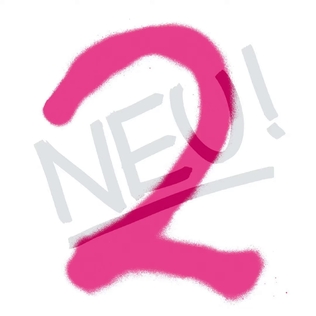
Neu! 2 is the second studio album by the krautrock band Neu!. It was recorded in January 1973 and mixed in February 1973, both at Windrose-Dumont-Time Studios in Hamburg, West Germany, and released in 1973 by Brain Records. It was reissued by Astralwerks in the US and by Grönland in the UK and Europe on 29 May 2001.

Neu! 4 is the fourth and final studio album by krautrock band Neu!, released in October 1995. It was revised and re-released as Neu '86 in 2010.
Motorik is the 4/4 beat often used by, and heavily associated with, krautrock bands. Coined by music journalists, the term is German for "motor skill". The motorik beat was pioneered by Jaki Liebezeit, drummer with German experimental rock band Can. Klaus Dinger of Neu!, another early pioneer of motorik, later called it the "Apache beat". The motorik beat is heard in one section of Kraftwerk's "Autobahn", a song composed to convey the feeling of driving on the German highway. It is heard throughout Neu!'s "Hallogallo", from their self-titled album Neu!, and used on all subsequent Neu! albums with differing tempos and variations.
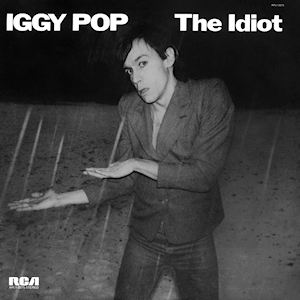
The Idiot is the debut studio album by the American musician Iggy Pop, released on March 18, 1977, through RCA Records. It was produced by David Bowie and primarily recorded at the Château d'Hérouville in Hérouville, France. The album followed the break-up of Pop's band the Stooges in 1974 and a period of drug addiction for both Pop and Bowie, after which the two moved to Europe in an effort to kick their addictions.

Harmonia was a West German musical "supergroup" formed in 1973 as a collaboration between members of two prominent krautrock bands: Cluster's Hans-Joachim Roedelius and Dieter Moebius joined by Neu! guitarist Michael Rother. Living and recording in the rural village of Forst, the trio released two albums—Musik von Harmonia (1974) and Deluxe (1975)—to limited sales before dissolving in 1976. AllMusic described the group as "one of the most legendary in the entire krautrock/kosmische scene."

Michael Rother is a German experimental musician, best known for being a founding member of the influential bands Neu! and Harmonia, and an early member of the band Kraftwerk.

Klaus Dinger was a German musician and songwriter most famous for his contributions to the seminal krautrock band Neu!. He was also the guitarist and chief songwriter of new wave group La Düsseldorf and briefly the percussionist of Kraftwerk.

Neu! '72 Live! in Düsseldorf is the final entirely new album released to date by krautrock band Neu!.
La Düsseldorf was a German band, consisting of onetime Kraftwerk drummer and Neu! multi-instrumentalist Klaus Dinger and occasional Neu! collaborators Thomas Dinger and Hans Lampe. La Düsseldorf was formed after Neu! disbanded following the release of their Neu! '75 record. They released a string of successful albums during the late 1970s and early 1980s, and were considered highly influential by Brian Eno and David Bowie, with Bowie going so far as calling La Düsseldorf "the soundtrack of the eighties".
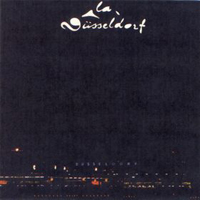
La Düsseldorf is the first album of the band La Düsseldorf.
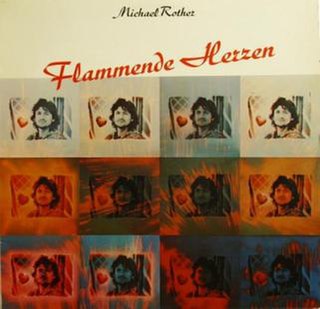
Flammende Herzen is the debut studio album by the German solo artist Michael Rother. It was released in 1977 and includes the single "Flammende Herzen" b/w "Karussell". The music was used the following year to soundtrack Flaming Hearts. It was Rother's first solo venture after having recorded five albums prior as a member of Neu! with Klaus Dinger and Harmonia with Hans-Joachim Roedelius and Dieter Moebius.

Live in Tokyo 1996 Vol. 2 is a 1999 live album by German band La! Neu?, recorded during their 1996 Japanese tour at a concert in Tokyo. Despite its title, the album actually consists of the first half of the concert, the second half having been released in 1998 as Cha Cha 2000 - Live in Tokyo 1996 Vol. 1. The album consists of a mixture of live improvisation and set songs, including some sampled material from English musician Mick Lount.

Japandorf is a 2013 album by Klaus Dinger and several other musicians, released under the name "Klaus Dinger + Japandorf" by Grönland Records. It was recorded in the year before Dinger's death on Good Friday 2008 and is the only one of three albums made since 1998 to have been released. It was originally intended to be released as a La Düsseldorf album, but this was blocked at the last minute by Hans Lampe, the band's original drummer.
"Isi" was a 1975 single by the German band Neu!, released in the United Kingdom to promote their album Neu! '75. Like its predecessor "Super", it failed to chart and is now a collectors' item due to its rarity. It was sold in an unmarked paper sleeve by United Artists, who marketed Neu! in the UK.
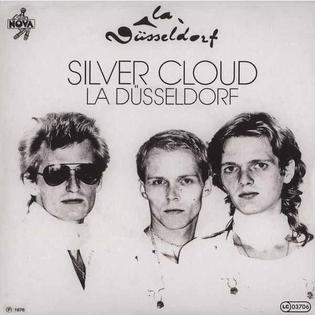
Silver Cloud is the debut single by German band La Düsseldorf, released in advance of their eponymous debut album. The single peaked at number 2 on the German music charts and made La Düsseldorf famous. Unusually for a high-charting single, "Silver Cloud" is entirely instrumental. The single continues to be popular, and was re-released on CD in 2008.

Crazy is a 2010 12" vinyl single by German band Neu!. It was released shortly after the Neu! Vinyl Box on Grönland Records as a part of Record Store Day. It was the first Neu! single to be released since Isi in 1975 and the only single to be taken from Neu! '86. It was sold in a limited edition and was only available for a short time after 17 April 2010.

"Super" is a single by German band Neu!, released in 1972. It failed to chart and has never been re-released, but has become a collector's item due to the rarity of the original vinyl 7". After the single's recording both the A and B side tracks were added to the album Neu! 2, which was released the following year.

















